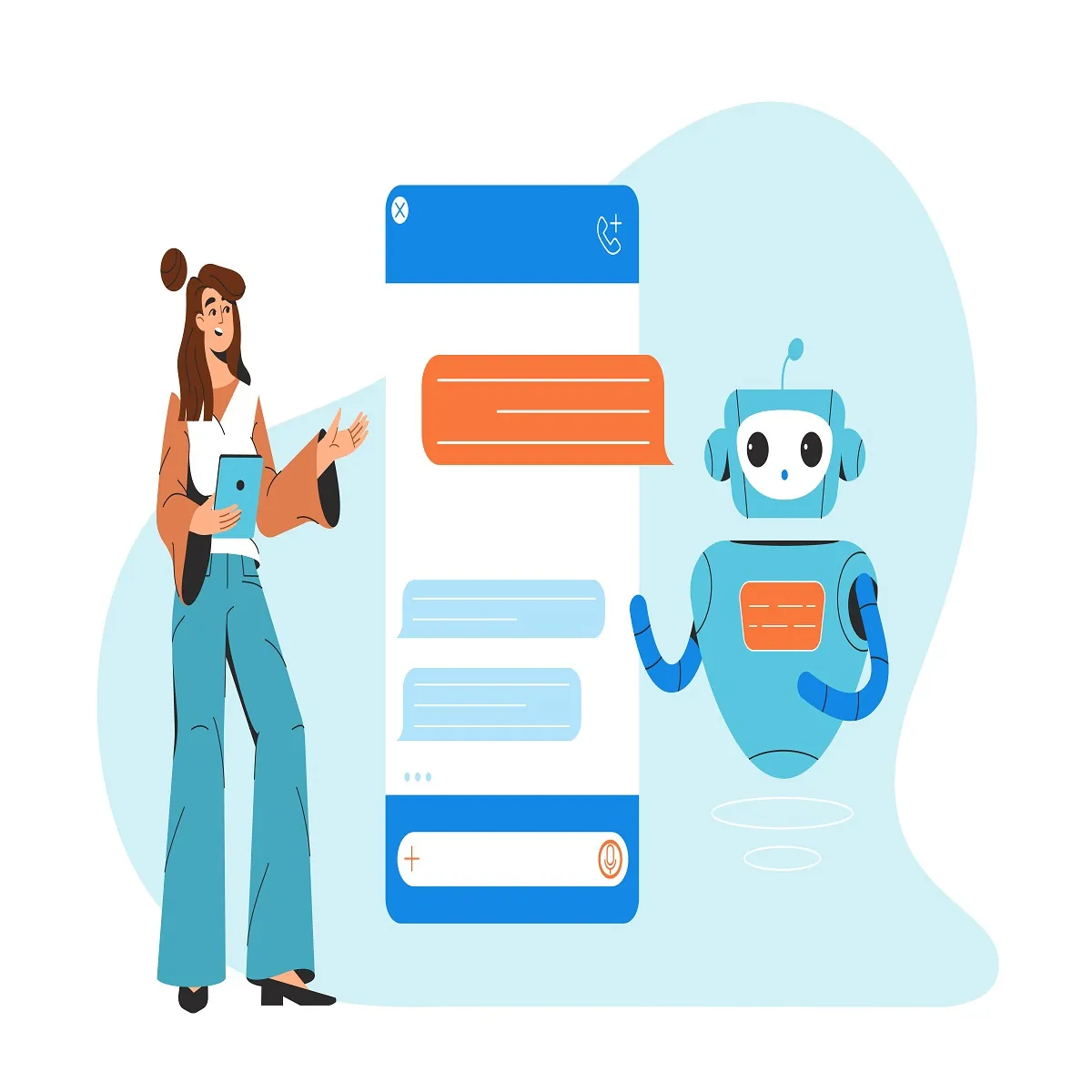Beginner’s Guide to AI for Customer Care
What is AI in Customer Care?
Artificial Intelligence (AI) in customer care leverages sophisticated algorithms and machine learning models to revolutionize the way businesses interact with their customers. By analysing vast amounts of customer data, AI can understand patterns, predict needs, and offer solutions in real-time. This technology allows businesses to automate routine tasks, such as answering frequently asked questions, processing transactions, or scheduling appointments, freeing up human agents to focus on more complex or nuanced customer queries. AI’s ability to handle large volumes of interactions at once enhances efficiency, helping businesses scale their support operations without compromising on service quality.
Moreover, AI enhances customer interactions by personalizing experiences across multiple channels, from text-based chatbots to voice assistants. With its ability to learn from each interaction, AI can tailor responses based on previous customer behaviours, preferences, and even emotional cues. This leads to more relevant and timely solutions, fostering customer satisfaction and loyalty. Whether through automated support, predictive analytics, or proactive engagement, AI in customer care is transforming how companies deliver exceptional service, ensuring faster response times, 24/7 availability, and more consistent experiences across diverse platforms.
Importance of AI for Improving Customer Experiences
AI plays a pivotal role in transforming the customer service landscape by creating more personalized and responsive experiences. By analysing vast amounts of data, ai for customer care can anticipate customer needs, deliver tailored responses, and resolve issues quicker than traditional methods. This not only improves the speed of customer interactions but also enhances the overall satisfaction and loyalty of customers. AI enables businesses to provide 24/7 support, ensuring customers can always reach assistance when needed, regardless of time zone or location.
Benefits of Using AI in Customer Service Operations
Incorporating AI in customer care offers numerous benefits. Firstly, it helps reduce response times and operational costs by automating routine tasks, such as answering frequently asked questions or processing basic transactions. AI also improves accuracy, ensuring that customers receive the correct information without delay. Additionally, AI-driven analytics provide insights into customer behaviour, helping businesses refine their strategies and offer proactive solutions. Ultimately, using AI in customer service operations leads to greater efficiency, higher customer satisfaction, and improved business outcomes.
How Does AI Work in Customer Care?
Artificial Intelligence (AI) in customer care functions by simulating human intelligence through computer systems to handle customer interactions. AI tools can interpret customer queries, understand context, and provide accurate responses using real-time data. When a customer contacts a business via chat, email, or phone, AI systems can instantly analyse the message and generate relevant replies, often without human intervention. This automation helps reduce wait times and enhances customer satisfaction.
Key AI Technologies Used
Several core AI technologies power modern customer care systems. Natural Language Processing (NLP) is one of the most significant, enabling machines to understand and respond to human language. NLP is used in chatbots and virtual assistants to interpret customer intent and respond conversationally. Machine Learning (ML) is another essential technology that helps AI systems learn from past interactions and improve over time. These systems get better at predicting what customers need and delivering faster, more accurate support. Other technologies include sentiment analysis, which gauges customer emotions, and speech recognition for voice-based support channels.
How AI Differs from Traditional Customer Service Methods
Unlike traditional customer service, which relies heavily on human agents, AI systems can operate continuously without breaks or fatigue. While human support may be limited to business hours, AI provides 24/7 service. Additionally, AI offers consistency in responses, reduces human error, and scales effortlessly to handle thousands of queries simultaneously. In artificial intelligence customer care, data is analysed at a speed and scale not possible with manual methods, enabling businesses to identify trends, personalize experiences, and make smarter decisions. This makes AI not just a tool for efficiency but also a strategic asset in delivering high-quality customer care.
How Does AI Enhance the Customer Experience?
One of the most powerful ways AI enhances customer experience is through personalization. AI systems analyse customer data, such as past purchases, browsing history, and previous interactions, to offer tailored responses and product recommendations. This level of customization makes customers feel valued and understood, increasing engagement and loyalty. For instance, an AI assistant might greet a returning customer by name and suggest products based on their previous orders something that would take much longer for a human to do manually.
Reducing Response Times with AI-Powered Chatbots
AI-powered chatbots are transforming customer support by delivering instant responses around the clock. These chatbots can handle a wide range of queries from basic FAQs to order tracking without human involvement. This not only reduces response times but also ensures that customers receive timely assistance, even during high-traffic periods or outside regular business hours. Fast, accurate replies help prevent frustration and contribute to a smoother customer journey.
Proactive Customer Service Using AI Insights
AI doesn't just react to customer issues anticipates them. By analysing large volumes of data in real time, AI systems can detect patterns and predict potential problems before they arise. For example, if many users are experiencing difficulty with a new product feature, AI can alert customer service teams to reach out proactively or even initiate automated support messages. In this way, artificial intelligence customer care enables businesses to move from reactive to proactive service, enhancing satisfaction and preventing issues from escalating.
Through personalization, speed, and foresight, AI is revolutionizing the way businesses engage with their customers, creating experiences that are not only efficient but also meaningful and memorable.
What are the Key AI Tools Used in Customer Care?
AI chatbots are among the most widely used tools in modern customer service. These bots use Natural Language Processing (NLP) and machine learning to understand and respond to customer queries in real time. Unlike scripted bots, AI chatbots can handle complex interactions and learn from past conversations to improve future responses. For example, companies like H&M use chatbots to help users browse products, while banks use them to manage basic transactions like balance inquiries. They operate 24/7, reduce support load, and ensure fast resolutions.
Virtual Assistants in Customer Service
Virtual assistants are advanced AI tools designed to support both customers and customer service agents. They can book appointments, provide product information, assist with troubleshooting, and even escalate complex issues to human agents when necessary. Unlike chatbots that focus on single interactions, virtual assistants can manage multi-turn conversations and access backend systems to offer more comprehensive support. Apple's Siri and Amazon’s Alexa are popular consumer-facing examples, while enterprise tools like IBM Watson Assistant are tailored for business use.
AI-Driven Customer Support Platforms
AI is now deeply integrated into full-scale customer support platforms that centralize communication and automate processes. These platforms use AI to route tickets to the right department, suggest help articles, and offer sentiment analysis to detect customer frustration. Platforms like Zendesk and Fresh desk incorporate AI to help businesses scale their support efforts while maintaining quality. With ai for customer care, such platforms enhance efficiency, consistency, and personalization by leveraging real-time insights, automation, and data-driven decision-making.
By combining chatbots, virtual assistants, and AI-powered platforms, businesses can deliver faster, smarter, and more satisfying customer experiences across every touchpoint.
What are the Benefits of Implementing AI in Customer Care?
Implementing AI in customer care significantly reduces operational costs. AI systems can handle repetitive and time-consuming tasks like answering frequently asked questions or managing basic transactions freeing up human agents to focus on more complex issues. This results in a leaner customer support team without sacrificing service quality. Businesses save money on staffing and training, while increasing the number of queries handled per day, leading to a higher return on investment.
24/7 Customer Support
One of the most impactful benefits of AI is its ability to provide round-the-clock support. Unlike human agents who work in shifts, AI tools like chatbots and virtual assistants are always active. Whether it's the middle of the night or a busy holiday season, customers can get help instantly. This ensures better service availability, boosts customer satisfaction, and helps companies meet the demands of a global customer base in multiple time zones.
Consistent Customer Experience Across Channels
AI ensures a unified customer experience across various communication platforms—whether it’s via live chat, email, social media, or mobile apps. By using centralized data and smart algorithms, AI systems provide consistent and accurate responses every time. This reduces confusion, builds trust, and reinforces a company’s brand voice across all digital touchpoints. Customers receive the same level of service, no matter how or where they reach out.
Scalable Solutions for Growing Businesses
As businesses grow, so does their customer base and AI is perfectly suited to scale with them. Traditional customer service models often struggle to keep up with rapid growth, but AI tools can manage increasing volumes of interactions without needing additional manpower. From start-ups to enterprises, AI solutions offer flexibility and scalability, making them a smart long-term investment for sustainable customer service excellence.
How Can you Get Started with AI for Customer Care?
Before adopting AI, it’s essential to evaluate your existing customer service setup. Identify areas where your team is overwhelmed or where customer satisfaction is lacking. Look at metrics like response times, resolution rates, and customer feedback. This assessment will help you pinpoint the processes that can benefit most from automation and AI enhancement, such as handling repetitive inquiries or managing high call volumes.
Choosing the Right AI Tools for Your Business
Not all AI tools are created equal. Depending on your business size, industry, and customer needs, you'll need to select solutions that align with your goals. For instance, smaller businesses might start with AI chatbots for basic support, while larger organizations could implement full-scale AI-powered platforms that integrate with CRM systems. Consider tools that offer scalability, analytics, and multilingual support to grow with your business.
Integrating AI into Your Customer Service Operations
Seamless integration is key to successful AI adoption. Start with a pilot program to test how AI tools work within your current workflow. Ensure they connect well with your existing channels—such as email, live chat, and social media. It's also important to train your team to work alongside AI tools, so human agents can handle escalations and monitor performance effectively.
Best Practices for Successful Implementation
To maximize results, follow proven best practices: begin small, monitor performance, and scale gradually. Regularly review analytics to fine-tune responses and ensure AI is delivering value. Maintain a human touch by offering live agent options when needed. With ai for customer care, a thoughtful and strategic rollout ensures your investment enhances customer satisfaction while driving operational efficiency.
What are the Challenges in AI for Customer Care and How Can you Overcome Them?
One of the biggest challenges in implementing AI in customer service is setting realistic expectations. Customers may assume that AI systems will provide instant and flawless solutions, but that’s not always the case especially for complex issues. It’s important to clearly communicate what the system can and cannot do. Using messages like “Let me help you with that” or “I’m still learning connecting you to a human agent now” helps set the right tone and avoids frustration.
Ensuring AI Complements Human Agents
AI should enhance—not replace—your human support team. The goal is to use automation for handling repetitive tasks, allowing human agents to focus on more complex, emotional, or critical interactions. To achieve this, businesses must design workflows where technology and people work hand in hand. For example, chatbots can manage initial queries and collect information before transferring the issue to a live agent with full context. This ensures smoother handovers and better customer experiences.
Addressing Data Privacy and Security Concerns
As automated systems collect and process large volumes of customer data, privacy and security become major concerns. Businesses must ensure their tools comply with data protection regulations like GDPR or CCPA. It’s essential to use secure data storage, encryption, and transparent policies to safeguard customer information. Customers should be informed about how their data is used and be given control over their privacy preferences.
Overcoming these challenges requires thoughtful planning, ethical implementation, and ongoing optimization. When done correctly, AI enhances customer service while building stronger, trust-based relationships.
What are the Future Trends in AI for Customer Care?
AI in customer care is becoming more intelligent, adaptive, and integrated. Where early tools focused on basic automation, today’s systems leverage advanced capabilities like Natural Language Understanding (NLU), sentiment analysis, and predictive analytics. These technologies allow businesses to respond not just reactively, but proactively—anticipating customer needs before they arise. Future developments are also expected to include deeper emotional intelligence and voice-based AI, making conversations more human-like and empathetic.
The Rise of Hyper-Personalization in Customer Interactions
One major trend shaping the future is hyper-personalization. AI systems are beginning to craft responses and recommendations based on a customer’s behaviour, preferences, purchase history, and even mood. By tapping into large datasets and real-time user signals, brands can tailor every touchpoint to feel uniquely personal. This not only improves satisfaction but also builds stronger customer relationships. Hyper-personalized experiences are already being used in sectors like e-commerce, banking, and telecom and adoption is rapidly growing.
AI’s Potential to Transform Customer Care in the Next 5–10 Years
In the coming decade, artificial intelligence customer care will likely evolve into a seamless blend of AI-driven efficiency and emotionally intelligent service. We can expect AI to manage increasingly complex issues, offer predictive solutions, and provide multi-lingual, omnichannel support. Additionally, AI will empower human agents with real-time suggestions and insights, making hybrid support teams more effective than ever. As technology becomes more accessible and ethical concerns are addressed, AI will be a cornerstone in delivering customer care that’s fast, personal, and deeply intuitive. The future of AI in customer service is not just about automation it’s about creating smarter, more meaningful connections at scale.
Conclusion
Artificial intelligence is reshaping the future of customer service by offering speed, accuracy, and personalization at scale. From chatbots and virtual assistants to predictive analytics, AI-powered tools are helping businesses deliver faster, more consistent support. By reducing operational costs, providing 24/7 service, and improving customer satisfaction, ai for customer care is no longer a luxury—it’s a necessity. Companies that embrace this shift will be better positioned to meet growing customer expectations and stay competitive. Whether you're a small business or a large enterprise, integrating artificial intelligence customer care solutions today lays the foundation for long-term success and sustainable growth in tomorrow’s digital landscape.








